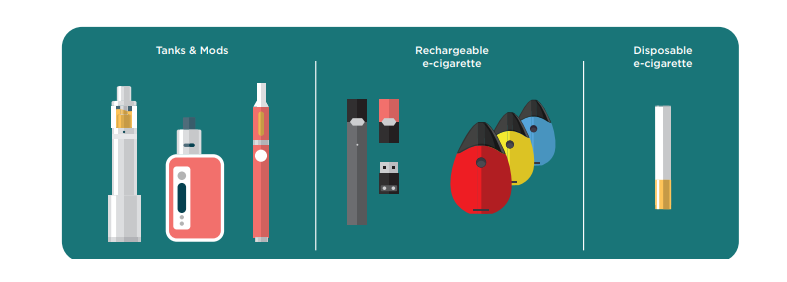Attention Parents: Vaping isn’t innocent. It’s addictive.
 Did you know that the U.S. Surgeon General declared teen age vaping an epidemic? It’s easy to see when you consider this:
Did you know that the U.S. Surgeon General declared teen age vaping an epidemic? It’s easy to see when you consider this:
- 1 out of 4 high schoolers vape
- 1 out of 10 middle schoolers vape
Closer to home, the 2021 Iowa Youth Survey1 found that more than one in four high school seniors had used tobacco in the last 30 days. The vast majority prefer e-cigarettes to traditional tobacco products. In 2021, 21.0 percent of 11th grade students admitted to using e-cigarettes in the last 30 days. That is even higher than the number of 11th grade students who used alcohol.
This news might be worrisome to you but know that many parents are in your same situation. Arm yourself with information and have an open discussion with your child is a place to start good start. How a parent reacts when they discover their child is vaping can have a huge impact on their child’s behavior.
1. 2021 Iowa Youth Survey. Iowa Department of Public Health Division of Behavioral Health Iowa, Department of Human Rights Division of Criminal and Juvenile Justice Planning.
If you want to help your teen quit vaping, here are a few tips for talking with them about vaping:
1. Know the facts. Start by recognizing vaping products. They are often look like a USB flash drive, a pen or even a watch. Fewer than half – 44.2 percent – of parents could identify a picture of a JUUL as a type of e-cigarette. More than one third could not recognize the device at all. Educate yourself on the products and the risks of vaping.
2. Give them time. Teenagers often struggle to articulate themselves. Give them the space to say what they need to say without scolding or jumping all over them. Create an environment that is easier for your teen to talk about it. For example, in the car when you are driving, ask, “I hear vaping is popular at school, are your friends doing that?”
3. Check your emotions. Approach your teen from a place of non-judgment. This can be hard. You may feel lost and even a little desperate to help your child stop but be patient. Approach the conversation as a way to understand versus judge.
4. Assess the situation. Your teen may want to stop but they may be having a hard time doing so. Many young people are not aware e-cigarettes contain nicotine or that nicotine addictive. Try to determine if your teen is struggling to stop vaping.
Start the conversation
Kids may believe they’re only vaping flavored water. In reality almost all vaping e-liquid contains nicotine and other harmful chemicals. Chemicals like lead, diacetyl and more. That’s why it’s so important to have an honest conversation with your kids.
Find the right moment.
A more natural discussion will increase the likelihood that your teen will listen. You might ask your teen what he or she thinks about a situation you witness together, such as:
Seeing someone use an e-cigarette in person or in a video.
Passing an e-cigarette shop when you are walking or driving.
Seeing an e-cigarette advertisement in a store or magazine or on the internet.
If you talk, they’ll listen
Once you start a conversation with your kids, make sure you keep the line of communication open. Keep talking to them about the dangers of vaping and why they should avoid it. The more you talk, the more likely they will never try vaping in the first place.
Here are some questions and comments you might get from your teen about e-cigarettes and some ideas about how you can answer them:
Why don’t you want me to use e-cigarettes?
- Science shows that e-cigarettes contain ingredients that are addictive. These ingredients could harm different parts of your body. Right now, your brain is still developing. This means you are more vulnerable to addiction.
- Many e-cigarettes contain nicotine. Using nicotine can change your brain to make you crave more nicotine.
- It can also affect your memory and concentration. I don’t want that for you!
- E-cigarettes contain chemicals that are harmful. When people use e-cigarettes, they breathe in tiny particles that can harm their lungs.
- The cloud that people exhale from e-cigarettes can expose you to un-safe chemicals.
What’s the big deal about nicotine?
- Your brain is still developing until about age 25. The Surgeon General reported that nicotine can harm your brain development.
- Using nicotine at your age may make it harder for you to concentrate, learn or control your impulses.
- Nicotine can even train your brain to become addicted to other drugs like meth and cocaine.
- I don’t say this to scare you. I want you to have the facts because nothing is more important to me than your health and safety.
Aren’t e-cigarettes safer than conventional cigarettes?
- Your brain is still developing. Scientific studies show that it isn’t safe for you to use any tobacco product that contains nicotine. This including e-cigarettes.
- Whether you get nicotine from an e-cigarette or a cigarette, it’s still risky.
- Some e-cigarette batteries have even exploded and hurt people.
I thought e-cigarettes didn’t have nicotine – just water and flavoring?
- I used to think that too. But many e-cigarettes have nicotine. There are also other chemicals in them that can be harmful.
- Let’s look at the Surgeon General’s website. They have a site on e-cigarettes (E-cigarettes.SurgeonGeneral.gov). You and I can learn more about e-cigarettes together.
I (or my friends) have tried e-cigarettes and it was no big deal.
- I appreciate your honesty. In the future, I hope you (or your friends) will stay away from e-cigarettes, and other tobacco products. Science shows that e-cigarettes contain ingredients that are addictive. These ingredients could also harm different parts of your body.
- Next time we go to the doctor, let’s ask about the risks of nicotine, e-cigarettes and other tobacco products.
You can never have too much support. That’s why Your Life Iowa created our supportive text messaging program. Sign up to receive encouraging messages, no matter what you may be facing.
Connect your teen with support
My Life My Quit is a free youth tobacco-cessation program to help your teen navigate their quit journey.
Looking for support for yourself?
Quitline Iowa is available to help adults quit tobacco products. It is free and confidential.
Are you, friends or family with someone who uses tobacco?
Find out how Your Life Iowa can provide support for them - and you.
